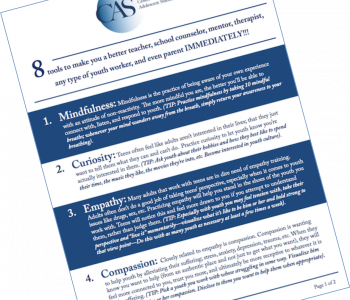

Sam Himelstein, PhD
Sam Himelstein is the founder and CEO of the Center for Adolescent Studies, Inc. He is passionate about working with youth and training the professionals that serve them.
4 Tips for Working with Marginalized Youth During the Holidays
As I entered the juvenile hall to teach a Thursday evening meditation class many years ago, I tried to prepare myself for the level of emotion that might arise: it was Thanksgiving Day. In hindsight, I don’t know if I could’ve better prepared myself for that evening. Youth were emotional because they were incarcerated and away from their families, because this was the first Thanksgiving they weren’t at home, because they’d lost a good friend or family member to street violence and this was the first holiday without them, or because they were in foster care and had to deal with other youth constantly venting about how hard it was to be away from family on Thanksgiving.
That year Thanksgiving, Christmas, and New Years day all fell on Thursdays, and I had the privilege of spending those holidays working with those youth; trying to teach mindfulness and help them apply the practice to their personal lives. While this was a great rapport builder, I generally don’t advocate for youth workers to work over the holidays if it means taking away from your own self-care. And for some of us, our agencies and organizations won’t let us work on holidays because they don’t want to or can’t afford to pay us more (another complexity that can lead to burnout for youth workers).
If you ever do get presented with the opportunity to work with youth over the holidays and your family is out of town or able to work around your work schedule (or simply your situation allows you to work without detracting from your self-care), you have the opportunity to learn a great deal about the struggles and complexities of how to work skillfully with marginalized and oppressed youth.
These four tips are simple but have the power to be extremely transformative and lead to building authentic relationships with the youth you work with.
- Don’t make any assumptions: Holidays can bring up a lot of emotions. For some it’s happiness and thoughts of family time, for others it’s sadness, depression, and disappointment. What’s important is that we don’t assume that the youth we work with share our paradigm (e.g., happiness, joy) about the holidays. Furthermore, it’s extremely important to not assume youth celebrate the same holidays as you. Some might celebrate Christmas, others Kwanza, others Ramadan. Thanksgiving might be a time thought of as spending time with family, or a constant remembrance of the massacre of Indigenous Peoples in this country. Let the youth lead the conversation (rather than you inserting/projecting your own thoughts) so that you can fully understand and empathize what the holidays mean in their world.
- Manage disclosure: I have written extensively about skillful self-disclosure, and my main point is that “skillful” means to contemplate if whatever you’re about to say is in the best interest of the youth you work with. For the purposes of this article, that means not disclosing anything that might offend the youth or create an impasse between you and them. Youth workers, like teachers, social workers, therapists, etc. oftentimes have holiday breaks. These are certainly well deserved, but being too expressive about this can have an adverse impact on the relationship. Stating that you’re “soooooo excited” for the holiday break can be misinterpreted by the youth and possibly lead to the idea that they are the reason you’re burned out. Or without thinking of the youth in your class that lost their brother to street violence or overdose, for example, you might say without second thought that you’re “so excited to see your brother” during their first holiday season without him. It’s no secret that I’m a big proponent of self-disclosure for reasons I set out here, here, and here, however during the holiday season I bring a keen sense of awareness to my practice of skillful speech and hold my tongue about my holiday plans unless I’m directly asked about them.
- Prepare youth for the holidays: Prepare the youth you work with for the holiday season. Work on building an authentic relationship so you learn about their life in general and ask them what types of emotions, family problems, etc. the holidays trigger. This simple conversation is the first step in brining awareness to how the holidays can be triggering. Attempt with the youth to distill the specific emotions, behaviors, arguments, and situations they might find themselves in and invite them to mentally prepare ahead of time.
- Offer at least two concrete self-care tools: Alongside preparing mentally for what the holidays bring, I like to offer at least one intrapersonal and one interpersonal self-care tool to help youth deal with strong emotions and possible discord. An intrapersonal self-care tool is a way for a youth to manage their own experience. As a mindfulness teacher, I’m biased toward teaching youth to identify and be present to emotions as they arise in their body and mind with an attitude of non-reactivity. We might review a deep breathing technique to mitigate some of the intense anger or sadness they feel. Additionally, we work on identifying where they feel the emotion in their body and then practice being non-reactive. While mindfulness is a great practice to manage stressful emotions, I believe the healing aspects of building authentic relationships are just as, if not, more important during the holidays. I encourage youth to recruit friends and family members, that might not be around, whom they could connect with; call, text, or somehow be in touch with in such a way that allows them to feel cared about and less isolated. This is an interpersonal self-care tool. I help them identify the individual(s), make sure they have their contact information, and even possibly help them make contact ahead of time to recruit them for the plan of action. This is a form of asking for help when it’s most needed and is a necessary skill to teach youth, especially those with significant trauma.
Whether you’re a therapist, educator, mentor, or any type of youth worker, being sensitive to the complexities of emotions youth feel around the holidays is a best practice. Learn more working with marginalized youth during the holidays through our 8-hr Trauma Essentials online course.
Related Posts
3 Ways Compassion Can Help Youth Impacted by Trauma
How Can I Better Support Marginalized Youth?

